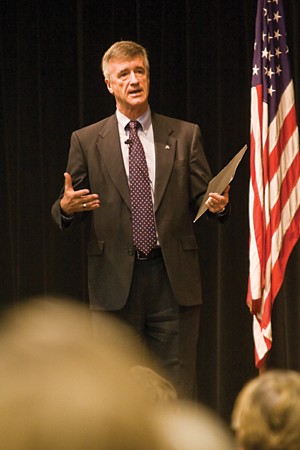President Robert Shelton and Provost Merideth Hay addressed nearly 200 people at the Appointed Professionals Advisory Council meeting Tuesday.
Both Shelton and Hay took questions from crowd members consisting of mostly staff and faculty, regarding rumors, proposals, lay-offs and job security. All questions varied in scope regarding university programs, but all revolved around the same thing: the reformation plan and cutting expenses.
Shortly into the meeting, Shelton admitted that the UA may have already laid off faculty, but he did not know for sure.
“”I think anybody who is in a position that’s not a tenured faculty position probably feels some vulnerability right now, and I am aware of that and I appreciate that.”” Shelton said. “”And there may be layoffs; there may be already. I can’t promise that there won’t be.””
“”When I think of the word ‘cut,’ I think of trimming that needs to be done and that doesn’t quite reflect on what’s going on here,”” said Ronald Wysocki, assistant staff scientist. “”We’re at the point where we’re removing vital organs to keep us alive.””
“”The purpose of this exercise . . . is to make sure we draw on the collective wisdom. . . . (W)e are committed to make this university better than it is now,”” answered Shelton.
Yet just trimming expenses to meet budgetary concerns, at this point, is no longer and option, he said.
“”There’s no way to ‘simply’ get more efficient at what we’re doing. We’ve already done that, we’ve already made cuts in multiple years,”” Shelton said. “”You’ve seen that it doesn’t work . . . so what we have to do is collectively figure out what we’re currently doing, that we don’t need to do.””
The reformation will need to cut in the range of $20 million in the fiscal year of 2010. Avenues of possible revenue are raised tuition, state and federal funding and external fundraising, Shelton said.
However, there were serious concerns raised by the audience about non-tenured faculty positions that could be eliminated in the reformation.
One audience member even went so far as to ensure that there is a grace period after layoff notices are given.
During the question-and-answer period, the well-being of students came up just once.
One adviser said she was at a loss on how to guide students if fields are merging.
“”We have 38,000 students. How do we guide them the best to make sure they can finish the program . . . whether in languages, teaching?”” the adviser said. “”I just want to make sure . . . we help these kids too.””
Shelton said the UA will do its best to help students.
“”With respect to students, whatever we do, we’ll ensure there is continuity for students who are already in major fields,”” he said. “”If someone is a freshman and they haven’t decided, then they may have to take another route. We’re not going to close out someone who’s out in their major field to get their degree.””
Christine Dykgraaf, adjunct instructor for Near Eastern Studies, voiced her concerns about a rumor that the College of Humanities will be one of the casualties in the reformation project.
“”No decision has been taken to eliminate, rename or combine the College of Humanities with anything else,”” Shelton said. “”That’s not saying it would happen, but I’m waiting to hear and get feedback. The College of Humanities is every bit as important and robust of any of our colleges.””
Throughout the changes, Shelton said he remains optimistic on the outcome.
“”I believe if we can get past the next 18 months, we will be in much better shape financially,”” he said.









